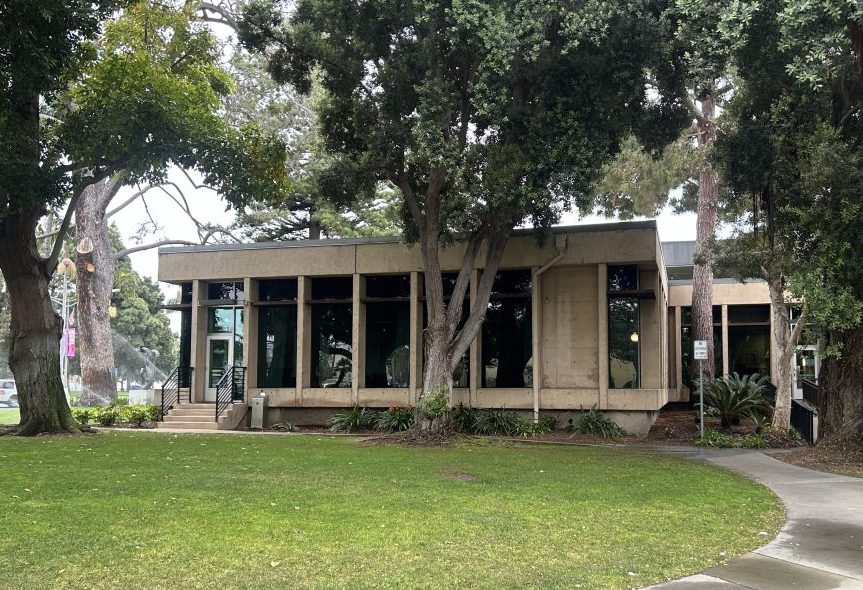
The City of Coronado didn’t follow proper state and local protocols when it approved the expansion of the Coronado Library Winn Room, according to a new lawsuit. The city failed to perform a state-required environmental review prior to approving an option that called for the removal of five healthy, mature trees, says Christine Mott, one of the lawsuit’s petitioners. In addition, the city didn’t obtain mandatory approvals from the Historic Resource Commission, she said.
“The lawsuit holds the government accountable for following the right processes,” said Mott, who heads up Save the Trees Coronado. “Whatever decision the city makes, it has to follow the rules, just like everyone else.”
Last August, the City of Coronado voted 3-2 to approve the $9.72 million Winn Room expansion which includes the removal of five trees that are from 51 to 100 years old. The planned expansion would increase the Winn Room seating capacity from 135 to 208, and would include a foyer and optional deck space, allowing for outdoor performances.
While many locals lamented the loss of the trees, proponents of the plan said the expansion would support the library’s growing role as a cultural hub.
But the City of Coronado failed to comply with the California Environmental Quality Act (CEQA), according to lawsuit. It didn’t perform an environmental review on all the options before the selection was made, as required by law.
According to SanDiego.gov, the purpose of CEQA is to inform decision-makers and the public about the possible environmental effects of projects. It’s designed to identify ways environmental impacts can be avoided or reduced, and prevent or avoid impacts to the environment through alternatives or mitigation.
According to Mott, the City of Coronado was required to perform environmental studies on all of the options that would have implicated the trees or the green space.
“They were supposed to perform environmental reviews before they voted on an option,” she said. “Now the city is trying to say they’re going to do an environmental review later. That’s putting the cart before the horse. You can’t do it that way.”
In addition, CEQA requires that the city hold a dedicated public hearing so that all community members can engage in the process, she said.
“They were supposed to have a dedicated, specific public hearing to allow the community and decision makers to be fully informed and engaged,” said Mott. “They didn’t do that.”
By policy, city leaders don’t usually discuss ongoing litigation, but former City Council member Casey Tanaka–who voted against the Winn Room expansion–weighed in. He said that, to his understanding, the City did follow correct protocols.
“The removal of trees by municipalities in California is a common practice, and there are categorical exemptions under CEQA for ordinary actions performed by municipal governments in our state,” said Tanaka.
Common categorical exemptions include city projects related to maintenance, and when a governing body replaces or reconstructs a structure in the same spot with substantially the same capacity and purpose.
But it’s not clear which categorical exemption the city will use. In addition, the staff report dated August 20, 2024 says the city will conduct an environmental review only once a project has been defined.

Tanaka said that the next time the issue comes before the city council, the staff will decide on the next steps in accordance with CEQA.
“That will be the appropriate time for CEQA comment because the August 20 decision was based on architectural estimates,” he said. “The next step will involve a more detailed set of plans.”
Tanaka also said that there had been ample opportunity for community engagement at council meetings and at Winn Room subcommittee meetings.
“People have not been shy about sharing their input,” he said. “I don’t think we missed an opportunity for more community engagement.”
But for the petitioners of the lawsuit, the city is exemplifying a bad pattern of practice. In February of 2024, the city council withdrew its plans to remove several trees by the lawn bowling green after another lawsuit, of which Mott was a plaintiff. She says that this was another situation where the city failed to comply with California environmental law.
“It seems like the city hasn’t learned its lesson,” she said.
In addition, local codes require approval any time a significant change is made to a historic designated area, such as where the library stands on Spreckels Park West, according to the lawsuit.
Mott says that the lawsuit might not change the outcome, but at least it will get the city to follow the law.
“Our hope is that this time around, the city won’t drag its feet, and will recognize that it did the wrong thing, and try to correct that,” said Mott. “As a community, whichever outcome you want to see, we want to be able to say we did it the right way.”
Mott says the petitioners of the lawsuit expect a hearing by next month.





In my opinion this litigation will only have the effect of costing the taxpayers to defend it and potentially take a longer time in the process of project review.When litigation like this goes forward the lawyers get paid to delay the project with taxpayer dollars. So in essence are only suing ourselves people, the only possible outcome one is to delay this project and to cost taxpayers money. It will not stop removal of the trees.
Thank you Christine Mott!
Thank you for this article. I had no idea about the removal of these trees. As a Coronado resident, I would do whatever I could to support keeping these trees. Is there an email contact for Christine Mott? Thanks.
Thank you for this article. I had no idea about the removal of these trees. As a Coronado resident, I would do whatever I could to support keeping these trees. Is there an email contact for Christine Mott? Thanks.